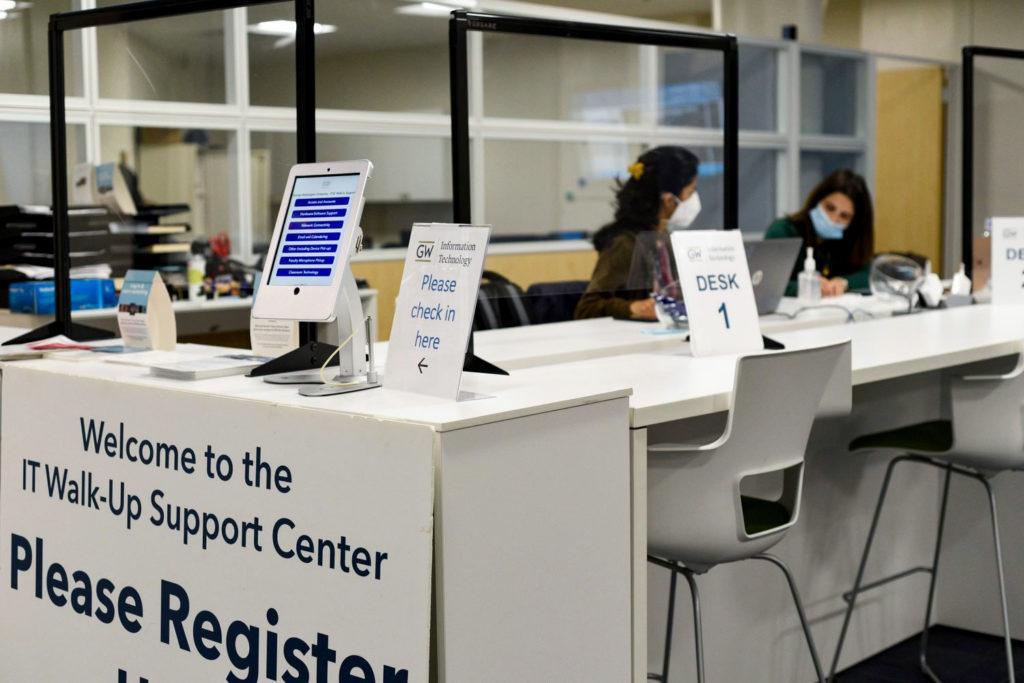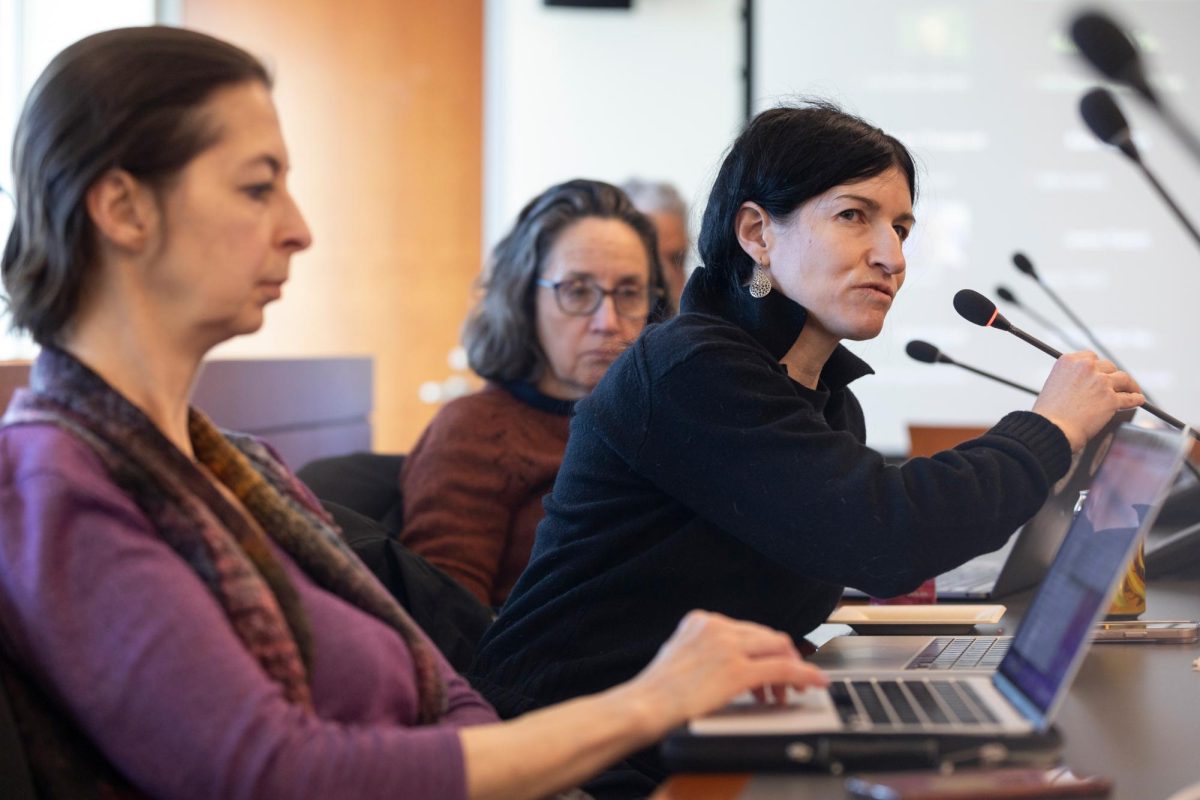Updated: Oct. 10, 2023, at 5:59 p.m.
GW’s Common Application will feature a new question about applicants’ home lives for the 2023-24 application cycle.
The University will test a new question that asks applicants if they spend more than four hours per week taking care of siblings, assisting or translating for family members, living independently, working outside the home or experiencing homelessness. The change to the Common App comes as GW continues to evaluate the fallout of the Supreme Court’s decision to end affirmative action in college admissions and how it will affect the admissions practices of the University.
“The questions should allow admissions officers to have a broader understanding of the life circumstances of applicants,” University spokesperson Julia Metjian said in an email. “With these new optional questions, admissions staff will have a more complete picture of the student’s academic achievement, the circumstances that led to that achievement and how the student positively impacts others.”
Metjian said Provost Chris Bracey’s University Admissions Policy task force is currently assessing the school’s admissions policies, and the group plans to release their initial recommendations this fall.
Metjian added that the new question is part of a pilot initiative among 25 institutions called Making Caring Common, a program created by Harvard University. A Making Caring Common spokesperson said Harvard’s initiative helps schools, parents and communities contribute to children’s moral and social development by providing strategies to strengthen empathy to schools within their network. The spokesperson said Making Caring Common works with key systems like college admissions to send messages to young people about the need to care for others and their communities.
“We also work within systems that send powerful messages to children, such as college admissions, to underscore the importance of ethical engagement and character,” the spokesperson said.
Experts in college admissions and diversity, equity and inclusion said information on applicants’ home lives may increase acceptance rates for low-income students.
Tolani Britton, an associate professor at the University of California Berkeley School of Education, said the new question about students’ home lives will pinpoint students who have commitments at home and come from working-class backgrounds.
“It gives many more students an opportunity to demonstrate the ways in which they are participating in ‘extracurriculars’ and demonstrating responsibility to their families and communities,” Britton said in an email.
Britton said there is markedly less racial diversity among more selective universities like the University of California system, where a state proposition banned affirmative action prior to the Supreme Court’s repeal of affirmative action in June. She said the new question likely aims to use other application metrics to diversify the student population.
California banned affirmative action for public universities in 1996, and the UC system saw a rapid drop in racial diversity after the proposition passed, according to the California Legislative Analyst’s Office. UC schools still struggle to reach their diversity goals, despite multiple attempts to remedy the lack of representation, according to a brief by the president and chancellors of the University of California.
The Common App will let universities hide self-reported information on ethnicity and race on the application, following the Supreme Court ruling that struck down consideration of race in college admissions earlier this year. The Common App will continue to collect self-reported racial information for “statistical and research purposes,” according to the platform’s website.
“I believe that the Common App seeks to broaden definitions of diversity and inclusion, for example, by socioeconomic status,” Britton said in an email. “An example of this is the question around familial responsibilities.”
Cassidy Puckett, an associate professor of sociology at Emory University, said she is skeptical about the efficacy of the new questions about applicants’ home lives bringing more students of varying socioeconomic backgrounds to universities because of “layers” of preexisting issues to college admissions, like college entrance exams like the SAT failing to represent applicants holistically.
GW has been test-optional since 2015. At the time GW dropped the requirement, officials said they allowed applicants to apply test-optional so the University could be more accessible to “underrepresented” groups of students, including minority, lower-income and first-generation students.
“There’s all sorts of different levels of problems in the way that we do college admissions. And so, different colleges and universities are taking small steps,” Puckett said. “And I think that this is another small step. But do I see big changes based on this one item? Maybe not.”
Puckett said elite universities need to build relationships with low-income schools that they traditionally don’t get students from by meeting with students or counselors to have more equal opportunity in admissions.
“There are problems in low-income public schools where there aren’t enough counselors. I mean, there’s just so many levels,” Puckett said. “So, the bottom line is, that colleges and universities would need to make that a priority.”
The Common App also implemented new gender identity options in the application — “X” and “another legal sex” — after first issuing an update that allowed applicants to share their preferred first name and pronoun set last year.
Jamie Remmers, the director of the master’s program office at the University of Southern California, said expanding gender and sexual identity options on college applications is the beginning of a “big push” for gender inclusivity in universities despite it once being a taboo subject that universities did not want to address.
“We’re conditioned to a heteronormative society, and asking that question is already going to be such an issue to so many people because we’re assuming everybody is straight,” Remmers said. “Without gender identity questions, you’re assuming everybody is cisgender. So these questions are also serving an equity purpose.”
Remmers said more information about individual applicants allows universities to better understand who attends their institutions and will foster a more inclusive environment.
“Collection of that data helps connect with the community,” Remmers said.
This post was updated to correct the following:
The Hatchet incorrectly reported that Puckett is an assistant professor. She’s an associate professor. The Hatchet also incorrectly reported that Puckett was skeptical of the efficacy of the new question about applicants’ home lives bringing students to GW. Puckett was referring to universities more broadly. We regret these errors.











